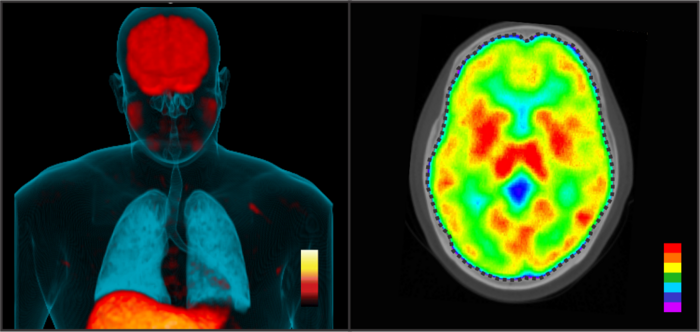FOR IMMEDIATE RELEASE

Credit: Sanjay Jain Lab
FOR IMMEDIATE RELEASE
Findings from a Johns Hopkins Children’s Center study in animal models show that a U.S. Food and Drug Administration (FDA)-approved antibiotic regimen for multidrug-resistant (MDR) tuberculosis (TB) may not work for TB meningitis. Studies in a small number of people also provide evidence that a new combination of drugs is needed to develop effective treatments for TB meningitis due to MDR strains.
In a study published Dec. 29 in Nature Communications, the investigators showed that the FDA-approved regimen of three antibiotics — bedaquiline, pretomanid and linezolid (BPaL) — used for treating TB of the lungs due to MDR strains, is not effective in treating TB meningitis because bedaquiline and linezolid are restricted in crossing the blood-brain barrier, a network of cells that prevents the entry of germs and toxins into the brain.
Tuberculosis, caused by the bacteria Mycobacterium tuberculosis, is a global public health threat. According to the World Health Organization, it is one of the leading killers by a single infectious agent.
About 1%–2% of TB cases progress into TB meningitis, the worst form of TB, which leads to an infection in the brain that causes increased fluid and inflammation.
“Most treatments for TB meningitis are based on studies of treatments for pulmonary TB, so we don’t have good treatment options for TB meningitis,” explains Sanjay Jain, M.D., senior author of the study and director of the Johns Hopkins Medicine Center for Infection and Inflammation Imaging Research.
In 2019, the FDA approved the BPaL regimen to treat MDR strains of TB, specifically those that lead to pulmonary TB. However, there are limited data on how well these antibiotics cross the blood-brain barrier.
In an effort to learn more, the research team synthesized a chemically identical and imageable version of the antibiotic pretomanid. They conducted experiments in mouse and rabbit models of TB meningitis using positron emission tomography (PET) imaging to noninvasively measure pretomanid penetration into the central nervous system as well as using direct drug measurements in mouse brains. In both models, researchers say PET imaging demonstrated excellent penetration of pretomanid into the brain or the central nervous system. However, the pretomanid levels in the cerebrospinal fluid (CSF) that bathes the brain were severalfold lower than in the brains of mice.
“When we have measured drug concentrations in the spinal fluid, we have found that many times they have no relation to what’s happening in the brain,” says Elizabeth Tucker, M.D., one of the study’s first authors and an assistant professor of anesthesiology and critical care medicine at the school of medicine. “This finding will change how we interpret data from clinical trials and, ultimately, treat infections in the brain.”
Next, researchers measured the efficacy of the BPaL regimen compared with the standard TB treatment — a combination of the antibiotics rifampin, isoniazid and pyrazinamide — used to treat drug-susceptible forms of TB. Results showed that the ability to kill bacteria in the brain using the BPaL regimen in the mouse model was about 50 times lower than the standard TB regimen after six weeks of treatment, likely due to restricted penetration of bedaquiline and linezolid into the brain. The bottom line, says Jain, is that the “regimen that we think works really well for MDR-TB in the lung does not work in the brain.”
In another experiment involving six healthy adults — three men and three women between 20 and 53 years old — at The Johns Hopkins Hospital, first-in-human PET imaging was used to show pretomanid distribution to major organs, according to researchers.
Similar to what was seen in the mice, the study revealed high penetration of pretomanid into the brain or central nervous system with CSF levels lower than those seen in the brain. “Our findings suggest pretomanid-based regimens, in combination with other antibiotics active against MDR strains with high brain penetration, should be tested for treating MDR-TB meningitis,” says Xueyi Chen, M.D., a pediatric infectious diseases fellow at the school of medicine and a study author, who is now studying combinations of such therapies.
The investigators noted limitations, including the small quantities of the imageable version of pretomanid per subject (micrograms) used. However, current evidence suggests that studies with small quantities of a drug are a reliable predictor of the drug biodistribution.
Along with Jain, authors from Johns Hopkins are Filipa Mota, Camilo A. Ruiz-Bedoya, Elizabeth W. Tucker, Daniel P. Holt, Patricia De Jesus, Martin A. Lodge, Clara Erice, Xueyi Chen, Melissa Bahr, Kelly Flavahan, John Kim, Mary Katherine Brosnan, Alvaro A. Ordonez and Robert F. Dannals. Another author is Charles A. Peloquin from the University of Florida.
This study was funded by the U.S. National Institutes of Health R01-AI145435-A1 R01-AI153349R01-HL131829, R21- AI149760, and K08-AI139371.
The authors declared no conflicts of interest.
Journal
Nature Communications




